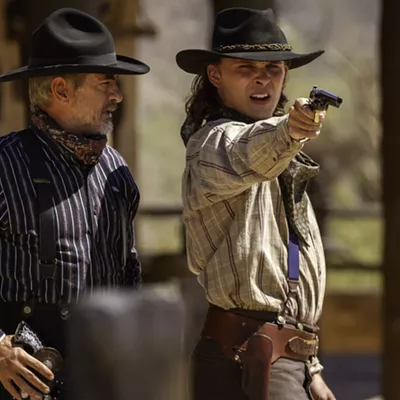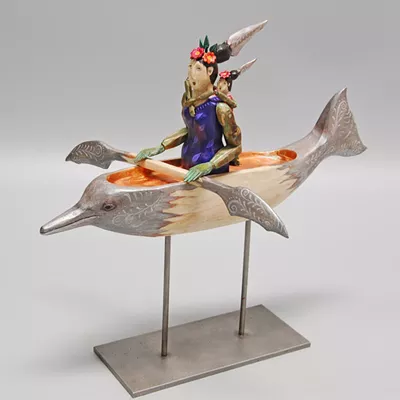How Could it have come to this?
How could a venerable arts institution, which has always found a way to work itself out of financial trouble and even grow its artistry in the midst of that trouble, find itself up to its ears in debt so that it is legitimately on the verge of canceling its season and perhaps even restructuring itself out of existence?
Let's establish something right as the curtain is rising on this drama: ATC is not crying wolf. Yes, we've heard pleas before—just last year for example—that things were in dire straits and a hardy influx of funds was desperately needed. Those funds materialized because board member Mike Kasser, founder of Holualoa (an international investment firm with offices in Tucson and four other cities) donated a million dollars to send the theater into its 49th season.
But that was before ATC hired an arts consulting firm—Albert Hall and Associates—to take a look at the organization in preparation for starting a search for a new artistic director.
In separate phone interviews, Lynne Wood Dusenberry, a long-time board member just recently named trustee chair, and Billy Russo, ATC's acting managing director put in place by the consulting firm last October, spoke not only of the state of the organization, but communicated a sense of the determination and optimism with which both are approaching the final days that will determine ATC's future.
Artistic director David Ira Goldstein had announced in 2013 his desire to retire after 25 years, but the organization was in a state of disorder and deep in debt—some said that was due to the missteps of former managing director Mark Cole. (Dusenberry and Russo would not point fingers.) The board asked Goldstein to stay on and he agreed.
But Goldstein really did want to retire, so the consulting firm, and specifically Tom Hall, a former managing director of the Old Globe Theatre in San Diego, wanted to give the organization a thorough going over as the critical first step of searching for a new artistic director. As a result, it was determined that before the organization could continue in good faith, the debt had to be paid down and—and this is a big "and"—there would be enough working capital to begin a new season.
Dusenberry says that ATC has been diligently working for a while to make the venture more sustainable, and Russo professed assurance that when he came on board and ever since there were numerous actions taken to raise money. There were also serious efforts to keep the current season's expenses below budget. Production designs were adjusted to cut costs. Ticket sales were not the problem during the last show of the season. Russo said there were curtain speeches asking for donations—a practice uncommon at ATC—and well-connected board members were furiously making calls. But this rather quiet effort proved too stealthy and ultimately resulted in the organization to the making of a very public cry for help.
"It may have seemed sudden," Dusenberry says, "but it really wasn't."
Changes have abounded since ATC's birth. Dusenberry's mother-in-law, Katie, as a member of the board then, helped nurture the changes almost from the get-go. There was the movement to becoming a professional theater, and also a revolutionary practice was established: performing a full season here and in Phoenix. This concept was instituted when David Hawkanson was managing director in the late '70s. Although an unwieldy concept, he reasoned that there were bigger businesses there to help solidify the financial support base.
ATC is the only professional theater in the country that produces a full season in two cities, according to Russo. The practice offers expansive possibilities, but it also demands much. Dusenberry and Russo were rather cagey about this being a source of overreaching. However, both stated that efforts would be made to look at everything if the theater can go forward.
When an email went out to subscribers saying that their money might not be returned to them, the charge of shady bookkeeping was floated, along with the request that the books should be available to the public. Well, they are. ATC is audited every year and their yearly 990 tax filing is available to the public since they are incorporated as a public entity. Other options concerning the subscribers' money are being considered, Dusenberry says, such as treating those funds as tax deductible contributions or finding ways to substitute other entertainment.
In reality ATC's current state has many determining factors. The Great Recession didn't help, Dusenberry adds, because contributors tend to restrict their giving, many making social service organizations their priority. However, quite reasonably, ATC now needs to have their business model evaluated and practices put in place to prevent such troubles in the future. And yes, that may require serious changes, especially for the new season on the horizon. Russo says that the entire industry is dealing with a different world.
"We not only need to embrace best practices but we also need to invent new practices," he says. "Funding sources are different. People's habits are different in how they find entertainment. But ATC is trying to look at this under the burden of an accumulated deficit. That's what makes them uniquely different."
So the community is unsettled, and it should be. This institution has become part of the Tucson's DNA. Dusenberry pointed to the generational aspect of ATC, which now includes not only her mother-in-law, but her daughter, who was a student at ATC's Summer Onstage program for three years. At one of the theater's fundraising galas she eloquently pled for money to support ATC's many educational programs. Russo thinks that ATC's longevity, its designation as a state theater and its effort to produce an eclectic roster of plays makes it an entity worth saving. Kasser has again guaranteed a million dollars to be raised in Tucson, but he has underscored that Phoenix needs to make that same commitment.
When I spoke to Dusenberry and Russo, there was a mere week left to raise the funds necessary to give ATC a chance to continue as an evolving institution with a chance to adapt in a changed culture. Many have invested to sustain its unique storytelling excellence, but its future is now painfully uncertain.
Information about how to donate can be found on ATC's website at arizonatheatre.org.






